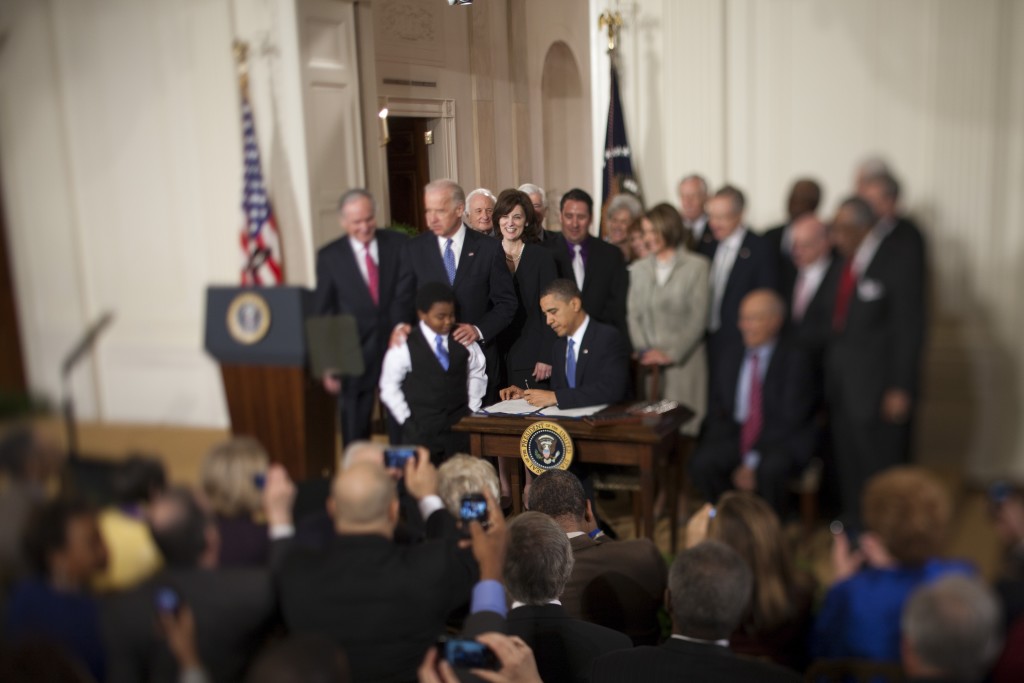Dig Deeper: What You Need to Know About America’s Health Care Crisis

June 21, 2012
Share
The Supreme Court is expected to deliver its ruling on the Affordable Care Act (ACA) within the next two weeks, a decision that could possibly overturn the health care reform bill passed in 2010 that has been a cornerstone of the Obama presidency.
For years, FRONTLINE has been investigating the problems with the country’s health care system, the dramatic push to reform health care policy and innovative new ways of addressing Americans’ health care needs — and rising costs.
Next Tuesday, we’ll continue the story in our joint investigation with the Center for Public Integrity, Dollars and Dentists, which explores the nation’s ruptured dental-care system and some possible solutions to fix it. (Watch a preview of the film above.)
Until then, here’s some of our best reporting on the health care crisis and some of the key aspects that could be affected by the Supreme Court’s ruling.
Obama’s Deal [April 2010]
“The president said that having people at the table is better than having them throw stuff at the table.” — White House Communications Director Dan PfeifferIn Obama’s Deal, FRONTLINE took viewers behind the headlines to reveal the political maneuvering behind Barack Obama’s effort to remake the American health system and transform the way Washington works. The investigation revealed the dramatic details of how an idealistic president pursued the health care fight — despite the warnings of many of his closest advisers — and how he ended up making deals with many of the powerful special interests he had campaigned against.
- Explore our chronology of how the health care reform bill passed, from its bipartisan origins early into Obama’s presidency to its passage on March 21, 2010 without a single Republican vote.
- Learn about the health care lobby’s influence in the final outcome of the bill, and some of the controversial deals cut by President Obama.
- Read extended interviews with key players, including Sen. Chuck Grassley (R-Iowa), who had been an important swing vote in President Obama’s bipartisan strategy for getting a health reform bill passed but who ultimately voted against the bill; White House Communications Director Dan Pfeiffer; and Michael Myers and Stuart Altman, two longtime health policy advisers who argue the long political history of health care reform is, in many ways, the story of the late Sen. Ted Kennedy (D-Mass.).
Sick Around America [March 2009]
“You can mandate that people have health insurance, but if it costs more than they can afford, it doesn’t matter.” — Insurance consultant Robert LaszewskiBack in 2009, as the worsening economy led to massive job losses — potentially forcing millions more Americans to go without health insurance — FRONTLINE traveled the country to examine the nation’s broken health care system and the need for a fundamental overhaul. The film dissects how millions of Americans go without health insurance, a private insurance system that leaves millions of others underinsured and at risk of bankruptcy, and the challenges some states have experienced in mandating health insurance.
- Explore early health care lessons from Massachusetts, which in 2006 implemented reforms mandating that everyone be covered by health insurance, but still faced problems of affordability.
- Learn what you need to know about navigating the world of private insurance from Georgetown University’s Karen Pollitz, who lays our for FRONTLINE the various types of insurance, the challenges of filing a claim and of buying your own insurance.
- Read extended interviews with health experts like Massachusetts’ secretary of health and human services JudyAnn Bigby, who had a key role in the state’s health reform program and Drew Altman, president of The Henry J. Kaiser Family Foundation.
- Also watch our investigation Sick Around the World (April 2008), which explores how five other capitalist democracies — the United Kingdom, Japan, Germany, Taiwan and Switzerland — deliver universal health care, and what the United States might learn from their successes and their failures.
Doctor Hotspot [July 2011]
“It pretty quickly became clear that there were hot spots of everything. … You could begin to take the data and tell stories with the data. And that’s an incredibly powerful tool for making change.” — Dr. Jeffrey BrennerAs health care’s rising costs have left some of the nation’s sickest and poorest without quality care, some people believe a local physician in Camden, N.J. might have the model to solve one of America’s most intractable problems: lowering the cost of care.
While analyzing medical billing data in Camden, N.J., Dr. Jeffrey Brenner mapped out “hot spots” of the impoverished city’s high-cost patients. By targeting unique care — including home visits and social workers — at the city’s most costly patients, he developed a program that he argues has both lowered health care costs and provided better care in Camden. The New Yorker‘s Atul Gawande, reporting for FRONTLINE, explored how Dr. Brenner’s medical strategy has garnered considerable attention — praised by some as a promising model worthy of more intense study and charged by others as a dangerous expansion of the health care system. But, Brenner told FRONTLINE, “Better care for people is disruptive change.”
- Read journalist and author Dr. Atul Gawande’s January 2011 feature in The New Yorker which explored Dr. Brenner’s organization, the Camden Coalition of Healthcare Providers, and other similar models to reduce the costs of health care.
- Learn more about how Dr. Brenner’s model has been received by supporters and by critics, including those like health professor Larry VanHorn who argues it would push an an “unsustainable expansion of the medial establishment.”
Facing Death [November 2010]
“Thirty percent of all care [is very glibly termed] waste. That’s the new mantra. It’s very hard to know what that means. And it’s very hard to bring that out of Washington and into a hospital and at the bedside, with a single individual facing death.” — Dr. Jerome GroopmanAs medical technology has advanced to keep sick Americans alive for longer than ever before, FRONTLINE took a closer measure of a less familiar but incredibly important element of today’s health care system: complicated end-of-life decisions.
With extraordinary access to The Mount Sinai Medical Center, one of New York’s biggest hospitals, FRONTLINE talked to doctors, patients and families who speak with remarkable candor about the increasingly difficult choices people are making at the end of life: when to remove a breathing tube in the ICU; when to continue treatment for patients with aggressive blood cancers; when to perform a surgery; and when to call for hospice.
- Read what doctors and family members told FRONTLINE about some of the big issues they face in end-of-life care, including intimate discussions on when to stop treatment, the cost of care and how prepared families are to make important decisions about their loved ones.
- See how the data breaks down about bone marrow transplants, intensive care, how we die and the costs of end-of-life care.
- Read extended interviews with doctors and health care experts, including Dr. Judith E. Nelson, who makes palliative care her life’s work; Dr. David Muller, who co-founded the nation’s largest academic physician home-visiting program; and Dr. Jerome Groopman, a professor of medicine at Harvard Medical School.
Related Documentaries
Latest Documentaries
Related Stories
Related Stories
Explore
Policies
Teacher Center
Funding for FRONTLINE is provided through the support of PBS viewers and by the Corporation for Public Broadcasting, with major support from Ford Foundation. Additional funding is provided the Abrams Foundation, Park Foundation, John D. and Catherine T. MacArthur Foundation, Heising-Simons Foundation, and the FRONTLINE Trust, with major support from Jon and Jo Ann Hagler on behalf of the Jon L. Hagler Foundation, and additional support from Koo and Patricia Yuen. FRONTLINE is a registered trademark of WGBH Educational Foundation. Web Site Copyright ©1995-2025 WGBH Educational Foundation. PBS is a 501(c)(3) not-for-profit organization.





















